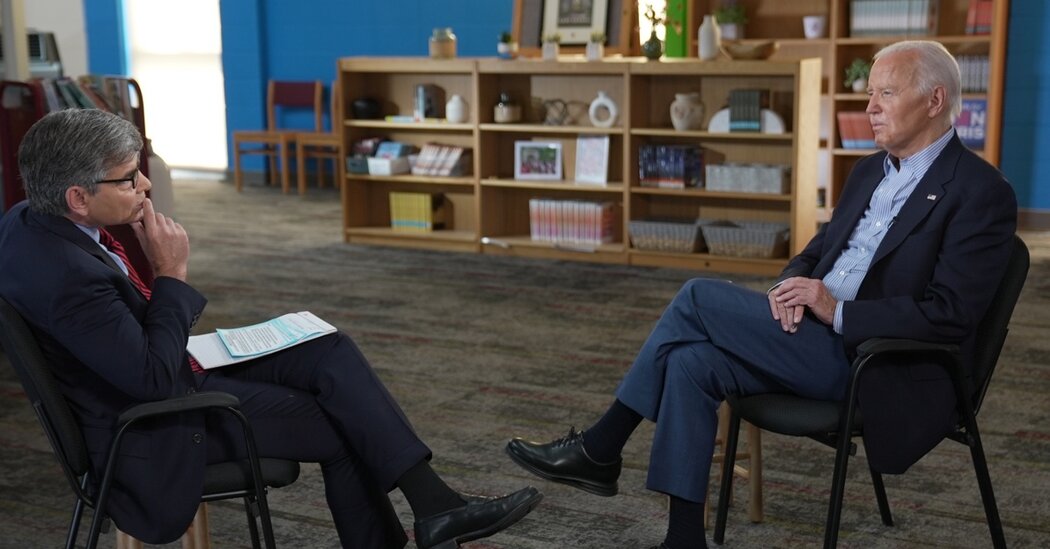It was, ultimately, an interview as personal as it was political, an interrogation focused more on the psyche and the inescapable realities of aging than on questions of policy or governance.
With respect but firmness, ABC host George Stephanopoulos pressed President Biden again and again on Friday about the fundamental questions Americans have been asking themselves over the past eight days, as 51 million people watched Biden struggle less to perform on the debate stage.
“Are you more vulnerable?”
“Were there any more missteps?”
“Has a neurologist, a specialist, done an examination?”
And as Biden brushed aside each of those concerns one by one — and the mounting worries about his health, his electability, and his ability to stay in office for another four years — Stephanopoulos focused on the issues of pride, dignity, and self-worth circulating beneath the surface.
“Are you sure,” the presenter asked, “that you are being honest with yourself?”
At 81, Mr. Biden is 18 years older than his interlocutor. The president arrived at Friday’s ABC interview tanned and tieless, his top two shirt buttons undone, and doing everything he could to exude youth and vitality. Yet one viewer couldn’t help but imagine the mop-haired Mr. Stephanopoulos in the role of a grown son, leading an aging parent to a conclusion that can be difficult and deeply painful to accept.
It’s too early to tell whether their 22-minute meeting Friday, recorded in a Wisconsin high school library and broadcast on ABC in prime time, will be among the most consequential interviews in presidential history. But it did have some of the highest stakes.
Democrats’ confidence in Biden’s ability to defeat his Republican opponent, former President Donald J. Trump, plummeted in the aftermath of last week’s debate. The president’s soft voice, long pauses and slurred words — once seen by supporters as a troubling, if harmless, fact of his public appearances — had taken on much darker implications.
Mr. Biden showed many of those traits again Friday, his voice at times hoarse and hesitant. His answers occasionally meandered. He was much better than the vacillating president who faced Mr. Trump last Thursday, but he was also not in the pugnacious form of his 2020 debates.
When Mr. Stephanopoulos got straight to the point — “You and your team have said you had a bad night” — Mr. Biden bared his teeth in a smile.
“He certainly did,” he replied, with a mixture of humility and nonchalance. Hey, it happens.
But then the host pressed. Nancy Pelosi, the former speaker of the House and an ally of the president, wondered whether Mr. Biden had more serious health problems. Mr. Biden blamed jet lag, but he had been back from Europe for more than a week. Did he realize, on stage, how bad things were?
The president, who has been with Mr. Stephanopoulos for decades, including when the anchor worked in the Clinton White House, tried to counter with some humor. “You've had some bad interviews,” he teased.
“I’ve had enough,” Mr. Stephanopoulos replied. But, he pointed out, millions of people were watching a debate that seemed to confirm fears about the president’s age.
When Biden blamed the press for amplifying the concerns of Democratic leaders, the host said he had heard from dozens of supporters who “want you to leave with grace.” And when Biden tried to distract by listing his administration’s accomplishments, Stephanopoulos responded with, “What has all that work cost you physically, mentally, emotionally over the last three and a half years?”
As the interview drew to a close, Mr. Stephanopoulos pivoted back to realpolitik. “If you stay, and Trump gets elected, and everything you’re warning about happens,” he asked, “how will you feel in January?”
“I'll feel like as long as I gave it my all and did the best job I could, that's what matters,” Biden said.
At one point, Mr. Stephanopoulos presented Mr. Biden with a series of scenarios for how he would respond if top Democratic leaders called on him to withdraw. The president smiled and laughed.
“I mean, these hypotheses, George,” he began.
The anchorman interrupted the conversation.
“It's not so hypothetical anymore.”

